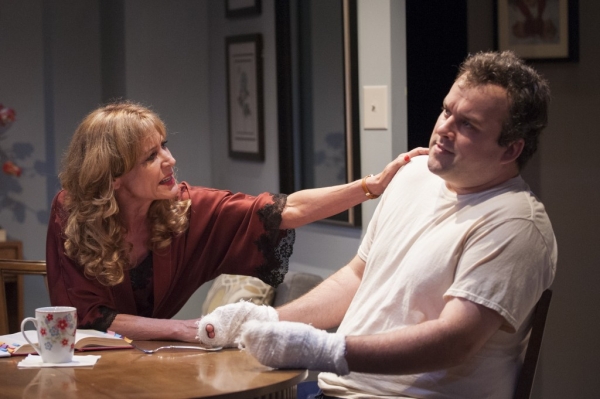Pride in the Falls of Autrey Mill

(© Margot Schulman)
Raw, brutal honesty is the name of the game behind Signature Theatre‘s world premiere of Paul Downs Colaizzo’s Pride in the Falls of Autrey Mill, as a seemingly perfect life in one of the most desired zip codes in town, is revealed as anything but.
At first glance, the picturesque home of the family front and center in the four-character play has everything going for it: a beautiful remodeled kitchen, expensive artwork on the walls, and what appears to be a loving, bonding moment between mother and son at the dining room table.
Yet when matriarch Carly, played with uptight suburban perfection by stage and screen vet Christine Lahti, practically gasps for words out of bafflement to what she has just been told by her youngest son, Chad (Anthony Bowden), it’s obvious that all is not what it seems.
Chad reveals to his mother that he is gay, and not “happy gay” but “gay gay.” Carly’s surprised reaction is exactly what you might expect from someone who lives in a “desperate housewives” fantasy world, where every move in the neighborhood is gossiped about and every action is thought out so as to not become the one who is talked about.
It’s a touching first scene, but also one with lots of humor, as Carly rattles off names of girls whom she would like to see her son date and the reasons why he might be “confused.” Upon “acceptance,” Carly is more concerned with whether Chad is the “man” in the relationship and the one “paying the check,” as if that would ever make it tolerable in her circles.
Colaizzo doesn’t paint Carly as someone who disagrees with her son’s choice, but as someone who is merely in denial.
In fact, there are several points in the play when Carly looks at herself in a mirror and the reflection paints a picture that just isn’t accurate — what she sees is a well-adjusted, happy Southern belle with a loving family, when in fact, the truth is something out of a suburban nightmare.
This is supposed to be a weekend to remember for Carly. Both her sons are home — Chad from college, Tommy (Christopher McFarland) from work — and they will be joining her and husband, Louie (Wayne Duvall), in a family photo to commemorate Carly’s winning first place in the neighborhood’s annual flower competition. Despite it being in “just the newsletter,” as Louie points out, Carly knows that a win like this will make her the envy of the neighborhood for weeks to come.
It’s that same neighborhood which presents the falsehood of the family. Autrey Mills is a community that doesn’t address problems, and this family (at least Carly) keeps up a façade of the perfectly functioning life.
In fact, Chad is a drunken mess, Tommy a binge-eating sourpuss who wants to forgo taking his bar exam to work in a pizza restaurant, and Louie is resentful of his life and is clearly not in love with his wife. And the perfect house even has a broken door that bangs and creates havoc upon shaking.
In the central role of Carly, Lahti is simply divine. She’s funny, impassioned, with the ability to transition in seconds from an empowered glance to one of desperation. Some of Lahti’s best scenes involve “hiding” in the hall closet on the phone with neighbors, gossiping about the events of those around her (“Your flowers were lovely, too, but someone had to win.”) The raw emotion Lahti expresses as Carly’s world crumbles — both figuratively and literally — is heartbreaking.
As Louie, you can see the exasperation on Duvall’s face from the very first encounter with his wife. Louie tries to be supportive of Carly and her flower first-prize ribbon , for growing the best in the community, and even talks of buying her a new car (something else for the neighbors to talk about), but it’s obvious he is just going through the motions. Duvall’s ambivalence is presented perfectly. Although his key scene involves an encounter straight out of the Michael Douglas/Kathleen Turner movie War of the Roses — one that might be better served with more humor — Duvall is at his best in a touching moment when Louie cleans the floor with his son Tommy, and expresses how proud he is proud of him.
McFarland as Tommy provides some of the biggest laughs, although the jokes about his overeating grow old. McFarland has a flair for physical comedy, and, somewhat surprisingly, there were several opportunities for him to shine on the small set using this gift. The character of Tommy also seemed to be the most grounded, and aside from Carly, it is the one who elicits the most sympathy from the audience.
While Bowden needs to turn down Chad’s childlike drunkenness, he captures the essence of the son who just wants to escape from the family and never look back. There’s a somewhat odd story twist between the brothers that seems out of place and takes away from the focus. Colaizzo seems to be trying to do too much in explaining the traits of these characters, when simply growing up in this stifling house would have been enough.
Still, the story unfolds rather interestingly. It is obvious early on how things are going to end for Carly and the family, yet director Michael Kahn makes the journey one worth watching, making great use of James Noone’s set design and some kitchen props that do more than expected.
Pride in the Falls of Autrey Mill doesn’t break much new ground in the tale of a suburban family falling apart, but its brutal honesty makes it worthy of a visit.










